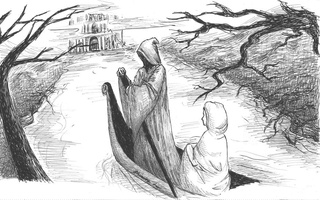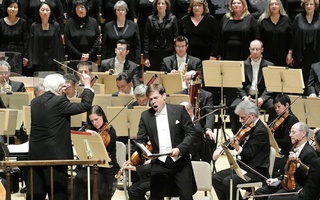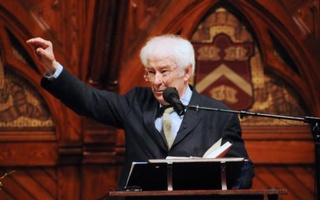Mozart’s iconic Requiem in D Minor, written by the composer on his deathbed, has a gentle allure—a restfulness to which the Back Bay Chorale will respond with a collaboration between a 27-year-old rising composer and the Nobel Prize-winning poet Seamus Heaney. On Sunday in Sanders Theatre, the Chorale will perform Mozart’s Requiem alongside Mohammed Fairouz’s new work “Anything Can Happen.” This will be the Boston premiere of the latter piece, which was co-commissioned by the Chorale and three other chorale groups, among them the Grinnell Singers at Grinnell College, where the piece was performed last year.
“It’s complementary how [Fairouz’s] title says, ‘anything can happen,’ which could be rather daunting,” says Craig Hughes, the president of the Back Bay Chorale. “So our music director, Scott Jarrett, paired it with Mozart Requiem, which is a very comforting piece.”
“Anything Can Happen” contains three poems by Heaney interspersed with Arabic passages chosen by Fairouz, who picked apocalyptic excerpts from the Injeel, the Arabic Christian bible. Fairouz then wrote music around these texts. For the singers, he wrote out Arabic transliteration and an English translation to help their pronunciation and understanding.
The piece also connects time periods. The final movement is a setting of Heaney’s poem “Anything Can Happen,” which is related to September 11. In writing the poem Heaney was inspired by an ancient Roman poet, Horace. “So, it goes back thousands of years, but it is very strangely resonant with the events of 9/11,” Hughes says.
The concert features two soloists. The baritone vocal soloist, David Kravitz, has just premiered in an opera, “Clemency”; the solo violist, Roger Tapping, currently on the faculty of the New England Conservatory, has just been appointed the violist of the Juilliard String Quartet.
Hughes says the piece is meant as a fusion of diverse influences. “You’ve got these cross-cultural elements across West and East, but also music across time.”
Read more in Arts
The Science of "Spinal Tap"Recommended Articles
-
DREAMLOVER: An Interview with Darren ArnofskyDarren Aronofsky '91 was just hired to direct the next Batman movie. But before he goes mainstream, he has one
-
Heaney Discusses His Translation of 'Beowulf'Citing the critical link between culture and linguistic voice in poetic translations, Emerson Visiting Poet and 1995 Nobel Prize winner
-
 Seamus Heaney Returns to Old Haunts in ‘Human Chain’
Seamus Heaney Returns to Old Haunts in ‘Human Chain’ -
Five Most Upsetting Upcoming Remakes of Classic FilmsWhy, Hollywood? Why?
-
 BSO Masterfully Performs Brahms's 'Requiem'
BSO Masterfully Performs Brahms's 'Requiem' -
 The Gates Unbarred: Seamus Heaney at Harvard
The Gates Unbarred: Seamus Heaney at Harvard













